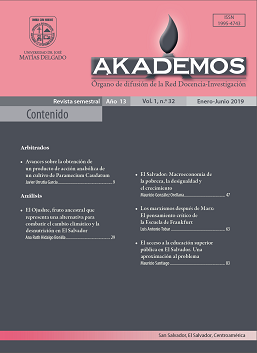Los marxismos después de Marx: El pensamiento crítico de la Escuela de Frankfurt
DOI:
https://doi.org/10.5377/akademos.v0i0.9272Palabras clave:
Escuela de Frankfurt, pensamiento crítico, Weil, Adorno, Horkheimer, Marcuse, industrial cultural, racionalidadResumen
La fundación del instituto de investigaciones sociales en 1922 dio un giro al pensamiento marxista que se venía construyendo. Félix Weil un joven estudiante argentino- alemán junto con otro grupo de intelectuales, entre ellos: Habermas, Adorno, Horkheimer, buscan reinterpretar el marxismo y sacarlo del dogma con que se estaba construyendo en la Unión Soviética. Por ello, deciden abordar una serie de temáticas que giran en torno a la crítica de la irracionalidad de la sociedad capitalista, retomando nuevos elementos de la teoría marxista, poco abordados por Marx y Engels y que eran necesarios para comprender la dinámica de la sociedad de la época. Estas formas de pensamiento se complementan con la visión de dos intelectuales cercanos a la Escuela de Frankfurt, y Habermas. Relacionado a ello, se hizo una comparación con la realidad salvadoreña de algunas tesis sostenidas por dichos pensadores y la desarrollada particularmente por salvadoreños.
Descargas
979
Descargas
Publicado
Cómo citar
Número
Sección
Licencia
© 2016 Centro de Investigaciones en Ciencias y Humanidades, CICH.

